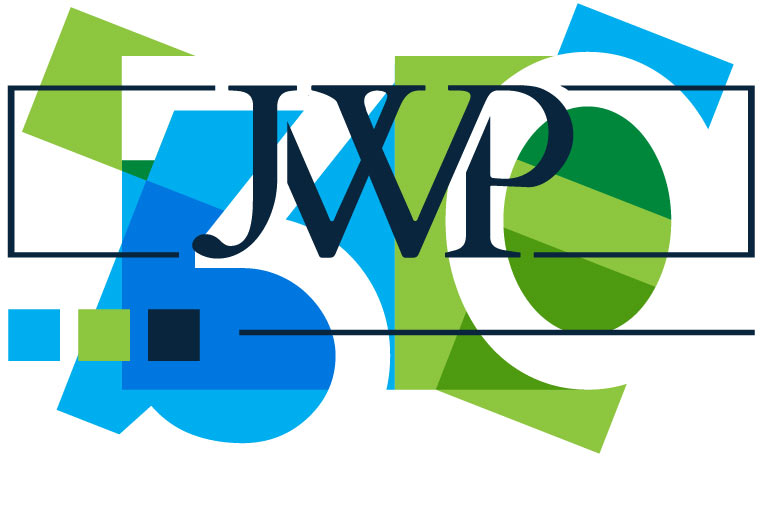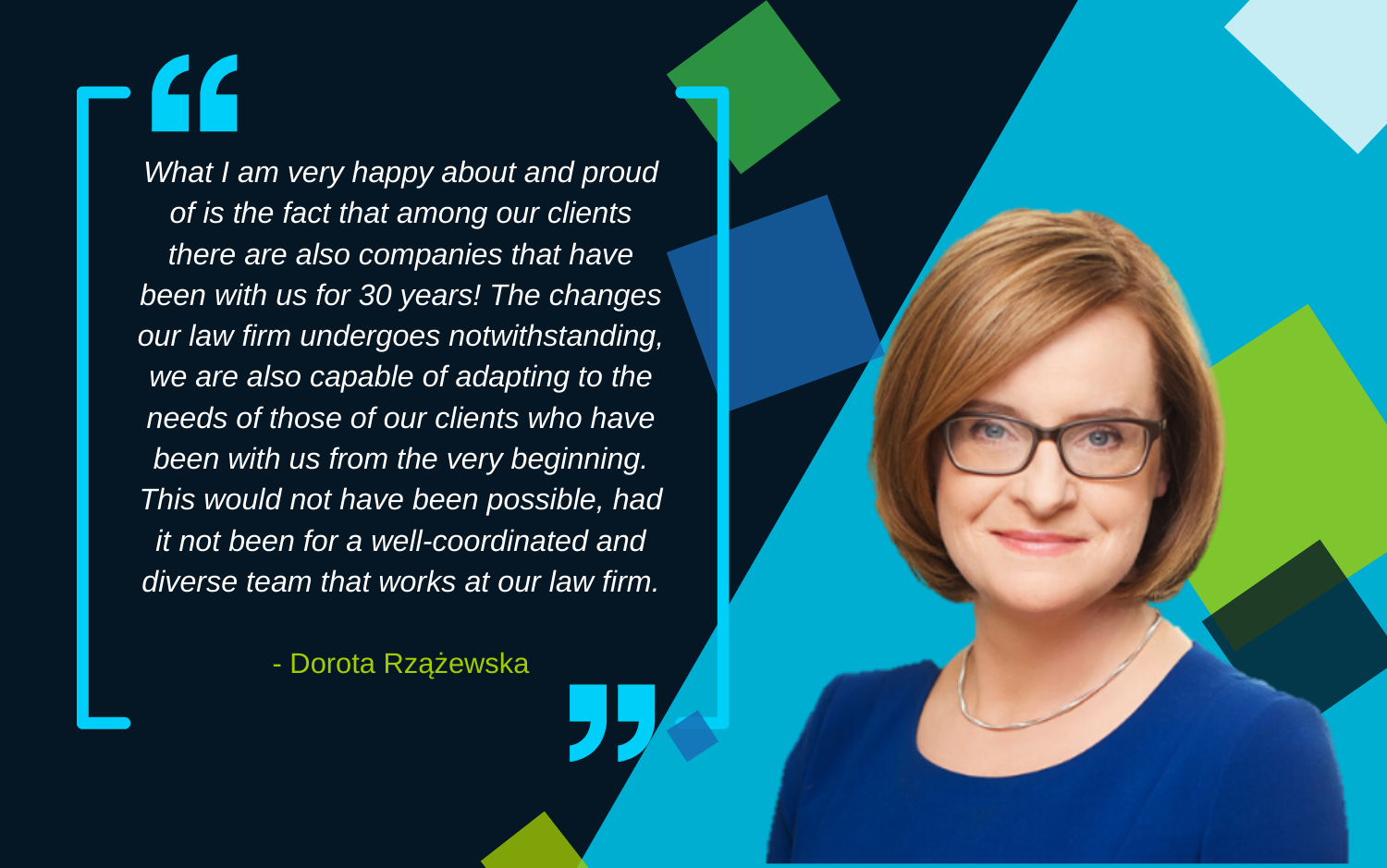Dorota Rzążewska is a managing partner of JWP Patent and Trademark Attorneys and the founder of JWP Foundation. To mark the round anniversary of both organisations, we talk about how their activities have influenced the world around us.
You are a managing partner of one of the largest patent law firms in Poland, which has been operating successfully for 30 years. How have the company and its surroundings changed over the years?
Thirty years on, the changes have been enormous. Our law firm was established in 1992. As an anecdote, I can tell you about a situation that happened after I joined the company. We had 15 people working at our company at that time and there were a handful of computers. Once I asked one of the assistants to send an e-mail. And I was met with refusal. So I asked her: “Why not?”. And the answer was: “Because I’m afraid to do it”. It was like that back when… When I talk about it today, I smile, but this just goes on to show how big the changes are that have taken place. Currently, we make use of modern tools and programs that support us in the implementation of various types of services. We manage our law firm and the cases we handle using advanced computer technologies and means of remote communication. We have introduced electronic circulation of documents, reducing paper consumption to an absolute minimum. We use a variety of databases that until recently were not so sophisticated. We have also adopted new tools based on artificial intelligence. The technology and management methods, this is what has changed tremendously. In addition, our company has grown in size significantly and so has its portfolio of cases and clients. We have also broadened our range of services and opened offices in Kraków, Gdańsk and Wrocław.
And how has the work of a patent attorney changed over 30 years?
The world of intellectual property has seen major changes. The scope of our services encompasses the preparation of patent searches, applications, proceedings before the patent office, that is, the bread and butter of a patent’s attorney work. We also have a team of lawyers with advocate’s and attorney’s-at-law licences, which also includes people who hold a patent attorney’s licence. We are able to offer specialised services related to the strategic management of intellectual property rights. We advise entrepreneurs on what actions to take and how to take them in a way that ensures a competitive advantage and, at the same time, cost efficiency. More and more customers are reaching for such a service. Another area of activity in which we are engaged is responding to signals coming from the financial sector industry. We support our clients in actions related to the valuation and trading of intellectual property rights. The use of these rights as financial tools is relatively rare in Poland, whereas they could be effectively used, for example, as collateral against loans. We encourage our clients to perceive intellectual property rights as tools for achieving business goals. Nowadays, it is becoming more and more common for patent attorneys to take on the additional role of business advisors.
Being the head of a company of one hundred and twenty people must be a demanding task, isn’t it?
Yes, it is. One hundred and twenty people is a large group. Due to the specific nature of our work, we are very diverse in terms of our education profiles and professional experiences. We include lawyers, economists, management and marketing specialists, linguists and translators, and, of course, a large group of people with higher technical education – electronics engineers, computer scientists, mechatronics engineers, biotechnologists, pharmacists and chemists. When I think about our team, it brings a smile to my face, because they are a group of talented people with a vast knowledge who are involved in their work and constantly improve their qualifications. They are, to a large extent, individualists, which poses a bit of a challenge when it comes to team building and management, as it places increased demands on the management staff. And for me as a managing partner having such a large team involves primarily undertaking great responsibility for the employees and their families. This is something that a responsible manager should bear in mind and take into account whenever making decisions on the development of a company. If the team is well-coordinated and the people enjoy working together, as is the case in our law firm, even navigating through difficult times comes easier, with the people being able to show a greater deal of understanding. That’s why such a group of people is simply better to work with. As far as this responsibility is concerned, I manage to bear it.
Where did the idea for the JWP foundation come from?
The JWP Foundation came about as a result of something that had been on my mind for a long time. In the course of my legal training as an attorney-at-law, and then during my judicial and patent attorney training, I became aware of how the level of knowledge about what intellectual property rights are and what role they can play in companies is significantly lower in Poland than in Western Europe or in the U.S. It occurred to me that unless such knowledge reaches the Polish entrepreneurs, scientific institutes and universities, the changes in our country will continue take place very slowly. It was when the foundation was being brought into existence that I got the strong feeling that the time has finally come for me to start sharing what I had learned with others. I concluded that this was going to be a good platform to share the knowledge through training courses and workshops for entrepreneurs, scientists, university students and the media. Therefore, the foundation has become operational and is carrying out its mission. We run an educational project called “Talent Advocates” which is held at universities and comprises a series of practical training courses for students and doctoral candidates. Some time ago, we have also aimed our activities at high school teachers and students. If young people become better acquainted with the protection of intellectual property rights and learn about the profession of a patent attorney this early on in their life, then there is hope that they will approach these issues more consciously and think differently about their future.
And what is it that you find particularly interesting about the work of a patent attorney?
We live in a world that is changing rapidly. As patent attorneys, we have to keep up with these changes and follow the technological development, because many industrial property rights cannot be granted unless the prerequisite of novelty is fulfilled, the “novelty” having the meaning of “global novelty”. We have to be up-to-date, keeping a constant lookout for the changes. What’s more, the world is taking a turn for the digital right now. We are seeing the emergence of artificial intelligence, which proves to be a challenge for lawyers, having already become the subject of their discussions. Can the artificial intelligence be the inventor? Or would it be the human who created the algorithm? In addition, we support inventors who create technologies that serve to solve the most pressing problems, such as the climate change and alternative energy sources, the COVID pandemic or issues related to national defence. This illustrates just how interesting are the everyday matters of the world around us that find their way onto the desk of a patent attorney. It is a very creative profession that requires constant updating of your technical, legal and business knowledge.
Can you give us an example of a case handled by the law firm that you found to be particularly memorable?
I remember one such case. It was one of my first infringement cases concerning a pharmaceutical patent. I represented a Polish company that had been sued for patent infringement by a U.S. company. That was a challenge. From the very beginning, it looked as though the odds we not stacked in our favour. Usually, there is a much larger capital behind the U.S. companies, which means that they can afford to present stronger evidence to support their arguments. Moreover, this company was represented by eminent intellectual property law scholars, one of them being an attorney-at-law (a former judge) who had supervised my attorney-at-law training. So the joy of winning was all the greater. The patent holder didn’t win his infringement case.
No case in this field is ever the same. And this is what is so fascinating about the work we do.

